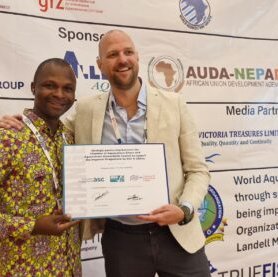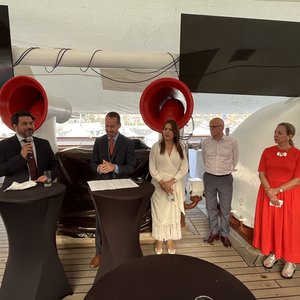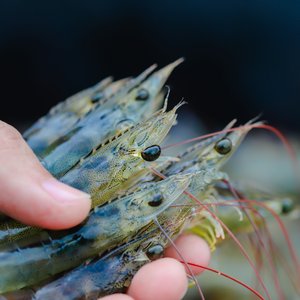NRC Report Recommends Strategy for Using Best Management Practices and Performance Standards for Culturing Shellfish
A new report by the National Research Council recommends how to apply best management practices and performance standards to maintain or restore ecosystems while culturing bivalve shellfish - such as oysters, clams, and mussels - in their natural marine environment. The report adds that farming bivalves could have both beneficial and harmful ecological effects, and that broader research should examine their influence on marine ecosystems.
Requested by the National Park Service, the report provides guidance on how to maximize the beneficial effects and manage the harmful ecological effects of bivalve mariculture -- the cultivation of these organisms in the marine environment. Many issues surrounding bivalve mariculture are location-specific, such as the culture operation type and environmental setting, and may not be addressed effectively by broad national standards. Therefore, the committee that wrote the report outlined general principles for using effective management practices and performance standards to help protect and restore the marine environment while increasing bivalve production.
Best management practices are methods or techniques that could be used to reduce impacts associated with certain activities, whereas performance standards set acceptable bounds for maintaining key indicators of ecosystem function. For example, to limit the introduction and transmission of disease among bivalves in a particular mariculture operation, a best management practice would be to screen for disease before transporting larval seed and to minimize the transfer of adult shellfish, while a performance standard would establish a tolerance level for the incidence of disease in the cultured bivalves and include a monitoring program to ensure compliance.
The committee emphasized that performance standards should strive to maintain the integrity of the natural ecosystem by using models and monitoring to identify the maximum amount of shellfish that could be cultured without having an unacceptable impact. The standards and some best management practices apply broadly to a wide range of locations, species, and culture techniques. However, many best management practices are specific to a particular locale, type of bivalve, or culture method and therefore are more effectively developed at a finer scale. Additional best practices and standards that could be applied across mariculture species and conditions are listed in Table S.1 of the report.
Bivalve mariculture could have positive as well as harmful effects on an ecosystem, the committee said. Harmful effects on an ecosystem include use of culturing gear that could alter water flow, composition of the sediment, and rate at which materials sink to the bottom; or harvest methods that disturb the invertebrates and plants that live on the bottom, such as seagrasses that provides habitat for fish. However, bivalve mariculture could also benefit ecosystems by increasing water clarity through filtration and by fertilizing seagrasses with excreted waste products. Mariculture gear also increases the availability of structured habitats that support higher densities of fish and invertebrates which prefer such a habitat. On the other hand, the addition of hard surfaces could also promote the colonization and spread of non-native species, for example the sea squirt.
The committee also recommended that states streamline the permit process and identify appropriate areas for bivalve mariculture in state waters. At least 120 federal laws and more than 1,200 state statutes across 32 states, plus local regulations, affect mariculture, with most regulatory frameworks falling under state jurisdiction. While some laws and regulations may constrain mariculture development, others can serve to advance its growth. These often inconsistent and confusing laws form layers of local, county, state, and federal jurisdictions that produce an uncertain legal environment for mariculture business and reduce financing opportunities. At a national level, development of a consistent policy regulating interstate transfer of non-native bivalves would protect against negative consequences of inadvertent spread of disease and species introductions.
Moreover, shellfish growers should engage the local community and design their operations to minimize social and biological conflicts, the committee said. Mariculture operations that restrict public foot or boat traffic in nearshore waters or tidal areas face issues of public use and access rights. Education of the local community about the ecological benefits of bivalve mariculture may increase public acceptance, particularly in problem locations.
In addition, the committee called for further research that could examine the effects of mariculture at a scale more consistent with ecosystem processes, instead of focusing on the individual lease or a single, potentially impacted species. Research should also look at how mariculture activities affect birds, marine mammals, and marine turtles that share coastal habitats.
Economic research could address whether mariculture reduces fishing pressure on wild stocks and could quantify the economic value of ecosystem services of bivalves, both for mariculture and for restoration of wild stocks.
The report was sponsored by the National Park Service. The National Academy of Sciences, National Academy of Engineering, Institute of Medicine, and National Research Council make up the National Academies. They are independent, nonprofit institutions that provide science, technology, and health policy advice under an 1863 congressional charter. Committee members, who serve pro bono as volunteers, are chosen by the Academies for each study based on their expertise and experience and must satisfy the Academies' conflict-of-interest standards. The resulting consensus reports undergo external peer review before completion.
Read the report.
A public briefing of this report will take place at the Ocean Studies Board meeting in Washington, DC on March 1 at 3:15 p.m. (download agenda from link below).
For more information on the report, or to RSVP for the briefing, contact Jodi Bostrom of the Ocean Studies Board at (202) 334-2628 or via email.










